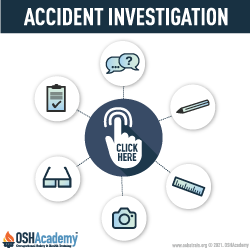Accident Scenario
Step 2. Document the Scene
After securing the accident scene, it's important to immediately begin documenting the scene by gathering evidence from as many sources as possible during an investigation.
Gather information about what directly caused and indirectly contributed to the accident.
Step 3. Interview Witnesses
Interviewing eyewitnesses to the accident is the most important and effective method to gather factual information about what happened in an accident.
Effective interviewing techniques include the following:
- Take initial statements from eyewitnesses and others. They can give you a lot of information about the accident.
- Thank the interviewee for participating, let them know the interview is confidential, and that it is not being conducted to place blame.
- Convey that the purpose of the interview is to determine the facts that ultimately lead to the root causes.
- Let them know that you may conduct follow-up interviews if more questions surface.
- Interview other interested persons such as supervisors, co-workers, etc., to get the facts related to training, supervision, and resources.
Other Methods
In addition to interviewing eyewitnesses to determine what happened, it's important to document the scene using other methods. Additional accident investigation tools include the following:
- Take photographs: A picture is worth a thousand words.
- Record videos: Videos can be the best way to record and document the scene.
- Take measurements: Helps to know distance and position of objects.
- Draw sketches: Identifies and locates objects and shows motion through time.
- Make observation: Look at the scene from different locations.
- Review records: Previous accident reports, training records, JHAs, etc.
You should also review records associated with the accident.
Records to Review
- Training records
- Disciplinary records
- Medical records (as allowed)
- Maintenance records
- EMT reports
- Police reports (rare)
- Coroner's report (fatalities)
- OSHA 300 Log (past similar injuries)
- Safety Committee records
Remember you are gathering information to use in developing a sequence of steps that led up to the accident. You are ultimately trying to determine surface and root causes for the accident. It is not your job, as an accident investigator, to place blame. Just gather the facts.
Knowledge Check Choose the best answer for the question.
6-6. What is the most important method to find out what happened in a workplace accident?
You forgot to answer the question!

